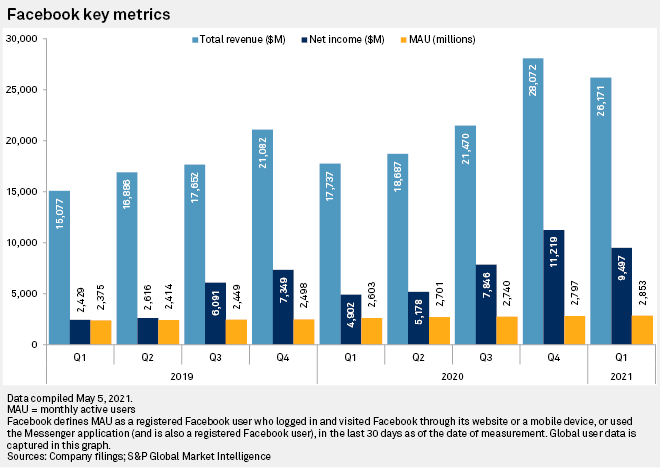S&P Global Offerings
Featured Topics
Featured Products
Events
S&P Global Offerings
Featured Topics
Featured Products
Events
S&P Global Offerings
Featured Topics
Featured Products
Events
Banking & Capital Markets
Economy & Finance
Energy Transition & Sustainability
Technology & Innovation
Podcasts & Newsletters
Banking & Capital Markets
Economy & Finance
Energy Transition & Sustainability
Technology & Innovation
Podcasts & Newsletters
S&P Global Offerings
Featured Topics
Featured Products
Events
5 May, 2021
By Anna Akins
A ruling by Facebook Inc.'s oversight board that partially upholds the company's suspension of former U.S. President Donald Trump from its platforms is likely to please few and solve little, tech policy analysts said.
But it will require the company to clarify some of its content moderation policies, which some called a win for transparency.
After months of deliberation, Facebook's independent oversight panel on May 5 upheld the company's decision in January to suspend Trump's access to posting content on his Facebook page and Instagram LLC account, finding that some of the former president's posts violated the company's platform policies and terms by promoting violence amid the riots at the U.S. Capitol. The board added, however, that it was "not appropriate" for Facebook to use a "standardless penalty of indefinite suspension." It gave the company six months to review the decision and determine a penalty that is consistent with rules applied to other users on the site.
The oversight body was launched in 2020 and comprises 20 members, including a former prime minister, a Nobel laureate, as well as journalists and legal experts across the globe. The idea for a third-party oversight board was proposed in 2018 by Zuckerberg, who has encouraged the government to take a more active role in overseeing how Facebook and its peers moderate content. Critics of the initiative argue that the company is merely attempting to stave off growing calls for more regulatory oversight by creating its own oversight panel.
The ruling comes at a time of heightened regulatory scrutiny on Facebook and its peers. The U.S. Federal Trade Commission and 48 attorneys general from across the U.S. filed two separate antitrust lawsuits late last year against Facebook, alleging, among other things, that the company has engaged in anticompetitive behavior. The lawsuits called for a slew of potential remedies — from structural remedies to requiring Facebook to gain approval for future M&A.
Carl Szabo, vice president and general counsel of NetChoice, a trade association that promotes free expression and free enterprise on the internet, said the board's decision would provoke controversy regardless of the outcome. "It's kind of a no-win scenario — no matter how they decide, somebody's going to be upset," Szabo said.
In its ruling, Facebook's oversight board specifically found that two posts made by Trump on Jan. 6 "severely violated" Facebook's standards prohibiting praise or support of people engaged in violence. It also determined that Trump "created an environment where a serious risk of violence was possible" due to his frequent comments regarding electoral fraud and related calls to action.
Daniel Castro, vice president of ITIF, an independent, nonpartisan research group based in Washington, D.C., that focuses on the intersection of technological innovation and public policy, in a May 5 statement called the board's decision a "win for transparency and fairness" while acknowledging the fledgling organization still has much room to grow as it continues tackling "some of the most difficult questions of online speech."
Ray Wang, principal analyst and founder at technology research and advisory firm Constellation Research, questioned whether the board or similar private organizations, regardless of their degree of impartiality, should be making decisions on sensitive topics such as politics and religion.
"Society has to rethink where large social networks and digital giants who wield these large communities, how they're regulated in the long run," Wang said in an interview.
Facebook's monthly active users hit 2.85 billion in the first quarter, an increase of 10% year over year. Its financials slipped a bit quarter over quarter but still exceeded expectations, with strong year-over-year growth fueled by a resurgence in advertising and comparisons to a period marked by pandemic-weakened demand in the first quarter of 2020.
The company reported total revenue of $26.17 billion for the just-ended period, up 48% from $17.74 billion a year ago. Advertising revenue for the quarter grew 46% year over year to $25.44 billion.

